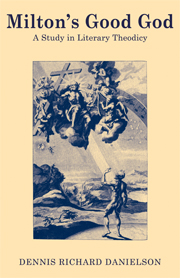Book contents
- Frontmatter
- Contents
- Preface
- 1 The contexts of Milton's theodicy
- 2 God and Chaos
- 3 Assertion and justification: providence and theodicy
- 4 Milton and the Free Will Defense
- 5 Theodicy, free will, and determinism
- 6 Eden and the “soul-making” theodicy
- 7 Paradise Lost and the Unfortunate Fall
- Epilogue
- Appendix: The unfortunate fall of Satan
- Notes
- Selected bibliography
- Index
7 - Paradise Lost and the Unfortunate Fall
Published online by Cambridge University Press: 04 August 2010
- Frontmatter
- Contents
- Preface
- 1 The contexts of Milton's theodicy
- 2 God and Chaos
- 3 Assertion and justification: providence and theodicy
- 4 Milton and the Free Will Defense
- 5 Theodicy, free will, and determinism
- 6 Eden and the “soul-making” theodicy
- 7 Paradise Lost and the Unfortunate Fall
- Epilogue
- Appendix: The unfortunate fall of Satan
- Notes
- Selected bibliography
- Index
Summary
In 1937, a year after making his remark about “the amazing superficiality of Milton's theodicy,” Arthur Lovejoy published an article entitled “Milton and the Paradox of the Fortunate Fall,” in which, as is now well known, he outlined a tradition within Christianity that views the sin of Adam as being a happy fault because “if it had never occurred, the Incarnation and Redemption could never have occurred” – a tradition in which, Lovejoy also claimed, Milton participates. Now Lovejoy's hypothesis – it is not an argument – has become a kind of cliché of Milton criticism, and its uncritical acceptance has itself helped to create the illusion that Lovejoy's earlier claim about Milton's theodicy is true. For if Lovejoy's hypothesis is correct, then Milton's theodicy is superficial indeed. If God needed the Fall in order to reveal what Lovejoy calls “the plentitude of the divine goodness and power” (p. 164), then Milton's careful avoidance of absolute predestination, his assertion of free will and its reflection of the divine image, his defense of free will against different forms of determinism, his exquisite presentation of sinless paradisal human existence – virtually his whole justification of the ways of God – all turn out to be little more than a useless facade over the nightmare abyss of “divine” intentions.
- Type
- Chapter
- Information
- Milton's Good GodA Study in Literary Theodicy, pp. 202 - 227Publisher: Cambridge University PressPrint publication year: 1982
- 1
- Cited by

